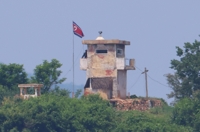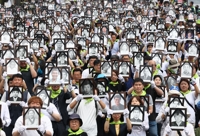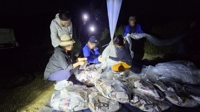S. Korea updates term for 'cultural property' after 6 decades
SEOUL, May 17 (Yonhap) -- South Korea will use the term "national heritage" instead of "cultural property," a term that had been in use for more than 60 years, as a new law came into force Friday.
Under the new Framework Act on National Heritage, the governing body overseeing cultural heritage matters, formerly the Cultural Heritage Administration, has also been renamed the Korea Heritage Service.
The country had widely used the term "cultural property" since the enactment of the Cultural Heritage Protection Act in 1962.
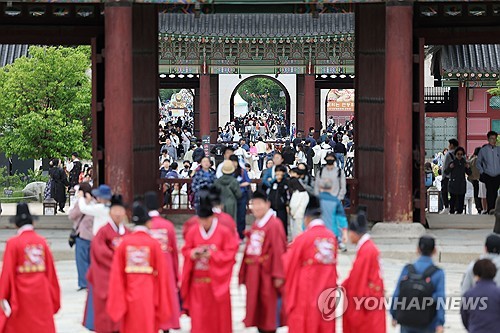
A gate of the Gyeongbok Palace in central Seoul is crowded with visitors as the country observes Buddha's Birthday, a public holiday in South Korea, on May 15, 2024. (Yonhap)
According to the heritage authority, this update in terminology aims to better reflect the current international standards used by organizations like the U.N. cultural agency UNESCO.
The previous term, "cultural property," was considered too commercial, focusing on the artifacts as mere objects rather than embodying their true cultural significance.
The previous classification system -- which was divided into the four categories of tangible cultural heritage, intangible cultural heritage, monuments and folk cultural properties -- was changed to three categories: cultural heritage, natural heritage and intangible heritage.
The Korea Heritage Service will hold various events nationwide to celebrate the renaming.
Until Sunday, 76 national heritage sites, including four major royal palaces -- Gyeongbok, Changdeok, Changgyeong and Deoksu -- Jongmyo Shrine and royal tombs, all from the Joseon Dynasty (1392-1910), will be open to all visitors free of charge.
In Buyeo, there will be an event on May 25-26, where participants can ride hot air balloons and view from above the city's relics that are part of the Baekje Historic Areas on the UNESCO World Heritage list. Buyeo was the capital of the Baekje Kingdom (18 B.C.-660 A.D.), which governed the southwestern part of the Korean Peninsula for centuries until it was conquered by the neighboring Silla in 660.
sshim@yna.co.kr
(END)
-
 (LEAD) N. Korea, China, Russia expanding nuclear arsenals at 'breakneck' pace: White House official
(LEAD) N. Korea, China, Russia expanding nuclear arsenals at 'breakneck' pace: White House official -
 N. Korea sends balloons carrying trash to S. Korea again: JCS
N. Korea sends balloons carrying trash to S. Korea again: JCS -
 Dozens of N. Korea's trash balloons spotted in Seoul metropolitan area
Dozens of N. Korea's trash balloons spotted in Seoul metropolitan area -
 (3rd LD) S. Korea to resume propaganda broadcasts against N. Korea's trash-balloon campaign
(3rd LD) S. Korea to resume propaganda broadcasts against N. Korea's trash-balloon campaign -
 (LEAD) N. Korea launches over 300 trash-carrying balloons toward S. Korea since Saturday
(LEAD) N. Korea launches over 300 trash-carrying balloons toward S. Korea since Saturday
-
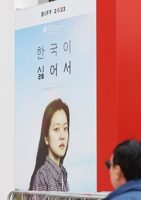 Korean cinemas thrive on artistic freedom, but challenges remain
Korean cinemas thrive on artistic freedom, but challenges remain -
 Webtoons at crossroads: Is AI opportunity or threat?
Webtoons at crossroads: Is AI opportunity or threat? -
 From hip-hop idols to global superstars, BTS shatters records over decade
From hip-hop idols to global superstars, BTS shatters records over decade -
 Directors thrive on streaming platforms amid sluggish film industry
Directors thrive on streaming platforms amid sluggish film industry -
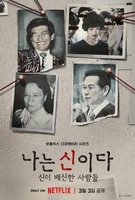 True-crime documentaries lure viewers to streaming platforms
True-crime documentaries lure viewers to streaming platforms


